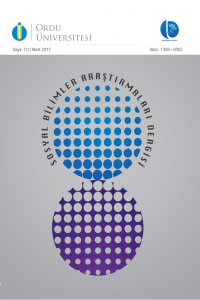Türkiye’deki Lojistik İşletmelerde Bulut Bilişim Uygulamalarının Benimsenmesi: Keşifsel Bir Araştırma
Öz
Bu makalenin amacı, gelişmekte olan bir ülkede lojistik sektörünü inceleyerek bulut bilişim ile ilgili araştırmalara katkı
sağlamaktır. Bu araştırmada; örneklemin belirlenmesinde yargısal örnekleme yöntemi kullanılmıştır. Araştırma bulut
bilişim uygulamalarının benimsenmesinde teknolojik, örgütsel ve çevresel faktörlerin etkisini belirlemeyi amaçlamaktadır.
Çalışmada betimleyici araştırma yöntemi kullanılmıştır. Örneklemde farklı büyüklükteki 10 lojistik firması bulunmaktadır.
Örneklemde blunan 10 lojistik firması ile Eylül-Ekim 2014 tarihleri arasında yüz yüze görüşme gerçekleştirilmştir.
Araştırmada önemli sonuçlar elde edilmiştir. İlk olarak; katılımcıların çoğunun bulut bilişimle ilgili farkındalığı olmasına
rağmen henüz bulut bilişim hakkında bilgisi olmayan katılımcılarda bulunmaktadır. Bulut bilişim kullanmanın nedenleri
literatürle benzer şekilde bulunmuştur: sürekli değişen teknoloji gereksinimlerini karşılayabilmek, bilgi teknolojisi ile ilgili
konuları dış kaynak kullanımı ile uzmanlara devretmek ve maliyetleri azaltmaktır. Bulut bilişim uygulamalarının
kullanılmama nedeni ise gizlilik, “veri sahipliğine” verilen önem, gizlilik ile ilgili riskler ve yasal süreçlerle uyumsuzluk
olarak belirtilmektedir. Bulut bilişim uygulamalarının kullanılmasında önemli koşullardan biri işletmelerin teknolojik
altyapısının tedarikçiler, paydaşlar ve devletin teknolojik altyapısı ile uyumlu olmasıdır. Araştırmadaki en önemli
akademik katkı (Teknoloji-Örgüt-Çevre) modelinde teknoloji boyutuna yeni bir değişken eklemektir. TÖÇ modelindeki
“Teknoloji” boyutuna yeni eklenen değişken “Uygulama Türü” değişkenidir. Beklentiler hizmet sağlayıcıların hizmet
düzeyine odaklanmaktadır bunun yanında lojistik işletmeler hizmet sağlayıcılardan lojistik ile ilgili bulut bilişim
uygulamaları beklemektedir. Araştırma gelişmekte olan bir ülkede bulut bilişim uygulamalarının kullanımı ile ilgili boyutları
inceleyen az sayıdaki çalışmadan biridir. Araştırma bulut bilişim ve lojistik literatürünün her ikisine de katkı sağlamaktadır.
Anahtar Kelimeler
Kaynakça
- Ajzen, I. (1991), The theory of planned behaviour, Organizational Behavior and Human Decision Processes, Vol.
- Akande, A. O. and Belle, J. P. V. (2014), “A proposed framework to assess and increase the cloud computing
- readiness of financial institutions in South Africa”, in Confluence the next generation information technology summit
- (conference), 2014 5th international conference in Uttar Pradesh, Noida, India, 2014, IEEE Xplore.
- Armbrust, M., Fox, A., Griffith, R. et al. (2009). Above the clouds: a berkeley view of cloud computing, EECS
- Bizarro, P. A. and Garcia, A. (2012), Cloud computing from an auditor’s perspective- risks and benefits. Internal
Öz
The purpose of this article is to contribute to a growing body of research on cloud computing, by studying logistics sector
in a developing country. In this study the judgement sampling method is used in determining the sample so as to get
information to find out the impact of Technological, Organizational and Environmental (TOE) context factors in the
adoption of cloud computing. Research has been performed through a descriptive research method. The sample size in
the study represents 10 logistics firms in various sizes and the interviews are performed in September-October, 2014 in
Turkey. There are a number of important findings. First of all, most of the participants are aware of the cloud computing
however there are also some who do not have knowledge about cloud computing yet. The main reasons of using
computing are found parallel with literature such as: competing with the continuously changing technology requirements,
outsourcing IT technology related issues to experts and reducing costs. The reasons for not using cloud computing are
as stated as privacy, the importance given to “data ownership”, insufficiency of service providers, privacy related risks
and incompatibility with legal processes. One of the most important necessities for adopting cloud computing is realizing
compatibility of technology infrastructure of firms with technological infrastructure of suppliers, stakeholders and
government. Most important academic contribution is adding a new variable to Technology dimension of TOE framework.
“Type of application” is a new variable in the “Technology” dimension of TOE model. Firms adopt cloud computing
depending on the properties of application. Expectations are most heavily focused on service level of service providers
and it is emphasized that logistics companies require special logistics applications in the clouds from service providers.
The research is one of the few studies looking for the dimensions of cloud computing adoption in logistics sector in a
developing country. The research both contributes to cloud computing literature and logistics literature.
Anahtar Kelimeler
Cloud computing Logistics Technology Organization Environment Model Turkey
Kaynakça
- Ajzen, I. (1991), The theory of planned behaviour, Organizational Behavior and Human Decision Processes, Vol.
- Akande, A. O. and Belle, J. P. V. (2014), “A proposed framework to assess and increase the cloud computing
- readiness of financial institutions in South Africa”, in Confluence the next generation information technology summit
- (conference), 2014 5th international conference in Uttar Pradesh, Noida, India, 2014, IEEE Xplore.
- Armbrust, M., Fox, A., Griffith, R. et al. (2009). Above the clouds: a berkeley view of cloud computing, EECS
- Bizarro, P. A. and Garcia, A. (2012), Cloud computing from an auditor’s perspective- risks and benefits. Internal
Ayrıntılar
| Konular | Ekonomi, İşletme |
|---|---|
| Bölüm | MAKALE |
| Yazarlar | |
| Yayımlanma Tarihi | 29 Mart 2017 |
| Gönderilme Tarihi | 28 Mart 2017 |
| Yayımlandığı Sayı | Yıl 2017 Cilt: 7 Sayı: 1 |
Bilginin ışığında aydınlanmak dileğiyle....
ODÜSOBİAD


